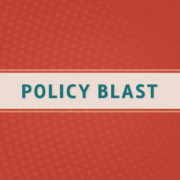NCUIH Endorses Bipartisan Bicameral Bill that Extends Grants to Address Maternal Mental Health and Substance Use Disorders to Urban Indian Organizations
On March 14, 2022, Representatives Katherine Clark (D-MA-5) and Senator Kirsten Gillibrand (D-NY) introduced the bipartisan, bicameral Into the Light for Maternal Mental Health and Substance Use Disorders Act of 2022 (H.R. 7073/S. 3824). The bill reauthorizes and expands a grant program to screen and treat maternal mental health and substance use disorders at $24 million through each of Fiscal Years (FYs) 2023 through 2028, as well as adds Indian Tribes, Tribal organizations, and urban Indian organizations (UIOs) to be eligible for these grants. The bill would also codify the Maternal Mental Health Hotline— a national 24/7 voice and text program that is operated by licensed health care professionals who are trained on helping pregnant or postpartum women and family members affected by maternal mental health and substance use disorders. The bill authorizes $10 million for each of fiscal FYs 2023 through 2028 to carry out this program.
The Into the Light for Maternal Mental Health and Substance Use Disorders Act of 2022 is co-sponsored by Representatives Jaime Herrera Beutler (R-WA-03), Michael Burgess, M.D. (R-TX-26), Doris Matsui (D-CA-06), Yvette Clarke (D-NY-09), Young Kim (R-CA-39), and Senators Shelley Moore Capito (R-WV), Tammy Baldwin (D-WI), and Lisa Murkowski (R-AK). The bill has been endorsed by over 120 organizations, including the National Council of Urban Indian Health (NCUIH).
“NCUIH is pleased to endorse Rep. Clark and Sen. Gillibrand’s Into the Light for Maternal Mental Health and Substance Use Disorders Act of 2022. We are grateful for the addition of Indian Tribes, Tribal organizations, and UIOs to be eligible for these critical grants to address maternal mental health and substance use, as these conditions are the most common complications of pregnancy and childbirth, and Native women face significant maternal mental health disparities,” – Francys Crevier (Algonquin), CEO, NCUIH.
Next Steps
The bill was referred to the House Energy and Commerce and Senate Health, Education, Labor, and Pensions Committees. It currently awaits consideration. This bill has been added to the NCUIH legislative tracker and can be found here.
Background
President Biden’s FY 2023 budget proposal demonstrates a strong commitment to advancing maternal health in American Indian/Alaska Native communities. The President’s budget supports the maternal mental health hotline and the screening and treatment for maternal mental depression and related behavioral disorders:
- “The United States has the highest maternal mortality rate among developed nations, and rates are disproportionately high for Black and American Indian and Alaska Native women. The Budget includes $470 million to: reduce maternal mortality and morbidity rates; expand maternal health initiatives in rural communities; implement implicit bias training for healthcare providers; create pregnancy medical home demonstration projects; and address the highest rates of perinatal health disparities, including by supporting the perinatal health workforce. The Budget also extends and increases funding for the Maternal, Infant, and Early Childhood Home Visiting program, which serves approximately 71,000 families at risk for poor maternal and child health outcomes each year, and is proven to reduce disparities in infant mortality. To address the lack of data on health disparities and further improve access to care, the Budget strengthens collection and evaluation of health equity data. Recognizing that maternal mental health conditions are the most common complications of pregnancy and childbirth, the Budget continues to support the maternal mental health hotline and the screening and treatment for maternal mental depression and related behavioral disorders.”
- “Improving Maternal Health ($10 million): Provides $4 million above FY 2022 enacted to improve maternal health in AI/AN communities. Funding supports preventive, perinatal, and postpartum care; addresses the needs of pregnant women with opioid or substance use disorder; and advances the quality of services provided to improve health outcomes and reduce maternal morbidity.”







Leave a Reply
Want to join the discussion?Feel free to contribute!